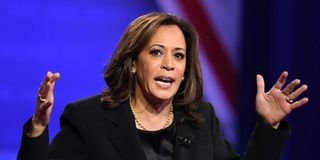How Kamala Harris fought US banks to rescue homeowners

US Vice President Kamala Harris.
What you need to know:
- Some 37,000 homeowners queued outside banks in Los Angeles to plead with the lending facilities to modify their mortgages, in the hope of staying in their homes and avoiding foreclosures.
- On Kamala's first day in office at California attorney general, she exerted her influence by gathering her senior team and ordering them to immediately act in the multistate investigation into unscrupulous banks.
On January 3, 2011, former San Francisco District Attorney Kamala Harris walked down the stairs of the California Museum for Women History and the Arts in Sacramento and took the oath of office as Attorney General of the state of California.
In her memoir, The Truths We Hold: An American Journey, Kamala talks about the California housing crisis, expressing how a month after her oath, 37,000 homeowners queued outside banks in Los Angeles to plead with the lending facilities to modify their mortgages, in the hope of staying in their homes and avoiding foreclosures.
On Kamala's first day in office, she exerted her influence by gathering her senior team and ordering them to immediately act in the multistate investigation into unscrupulous banks.
At every event she held, there was always a group of people exceeding 20, who had travelled to request her personal assistance. They brought their paperwork that consisted of accordion folders and manila envelopes overflowing with mortgage documents, foreclosure notices and handwritten notes. Others had driven for hundreds of miles to locate her.
Kamala was aware that tens of thousands of Californians were tenaciously slaving away to save their homes but lacked the ability to track down the attorney general in person. She, therefore, went directly to them, holding roundtable meetings at community centres on the west coast.

US Vice President Hamala Harris's memoir.
She wanted them to identify her team. She wanted her team of lawyers to know the housing crisis victims so that when they were sitting across from bank executives in a conference room, they’d appreciate who they were representing and comprehend the level of atrocity the banks had committed.
At one homeowners’ roundtable, a woman detailed, in tears, how she had purchased her first home in 1997. After falling one month behind on loan payment in early 2009, her home was foreclosed and she was left homeless.
In early March 2011, during the National Association of Attorneys General annual multi-day meeting at Fairmont Hotel, in Washington DC, Kamala flew in with her team. She discovered that the investigation into the national housing crisis was not complete.
There were many unanswered questions, yet the present delegation of attorneys generals were acrimoniously ready for a settlement that would facilitate the division of money amongst the 50 American states. Kamala was left dumbfounded how they’d concluded their final financial figures without thorough investigations.
What ultimately baffled her the most wasn’t the choosing of an arbitrary dollar figure to divide, but that in exchange for the settlement, the banks were going to be provided with a wholesale release against any potential future claims.
This would pardon them for past crimes and hand them immunity from the financial crimes they had committed, and that had caused the housing crisis.It would also prohibit the states from indicting future civil and criminal cases against the banks in relation to the mortgage crisis.
During a lunch break, Kamala informed her team that she wasn't returning for discussions, because the delegation had constituted preliminary conclusions in their communal decision.
The banks and the AGs had the misimpression that Kamala could be bullied into submission, but she refused to accede to their decision to collude with the embezzling banks.
Withdrawing her voice from the negotiations would influence considerable minds. During the housing crisis, California had more housing foreclosures than any other state.
Of the 10 cities hardest hit by the foreclosure crisis, seven were in California. If the banks couldn’t achieve a settlement with the California Attorney General, they weren’t going to settle with any of the other 49 attorney generals.
Kamala exploited her leverage and skipped the afternoon session, with her empty chair sending a powerful message and expressing her verbal stance better than her eloquence ever could. She opted not to sign anything that was going to preclude her from undertaking her own investigation.
California would have received between $2 billion and $4 billion in the initial settlement that the attorney generals had quickly agreed on without undertaking exhaustive investigations. However, the damage that had been administered by the banks in California alone was in excess of that settlement fee.
Kamala hired economists, data scientists and a unit of the brightest lawyers from consumer fraud, corporate fraud, and the criminal divisions, as well as sworn investigators. They launched state-wide investigations in California, in pursuit of the banks' illegalities.
The team was called the California Attorney General’s Mortgage Fraud Strike Force and the results were as astounding as Kamala had feared.
She then phoned Jamie Dimon, CEO of JP Morgan Chase bank that had exploited millions of vulnerable communities, and yelled at him incessantly for beguiling American homeowners.
Instead of the $2 billion to $4 billion settlement originally offered, Kamala secured an $18 billion deal, which ultimately grew to $20 billion in relief to California homeowners.
It was a monumental victory for the people of California. Kamala's stance on the real estate crisis eventually led her to become California’s senator on January 3, 2017, and US first female vice president on January 20, 2021.
The writer is a novelist, a Big Brother Africa 2 Kenyan representative and founder of Jeff's Fitness Centre (@jeffbigbrother).





